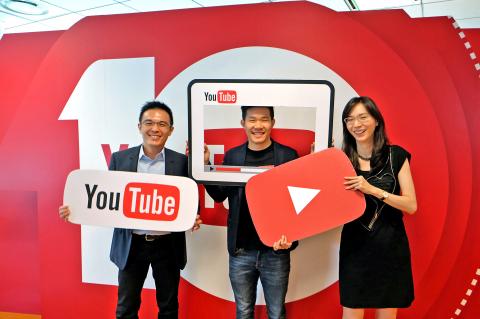Google Inc yesterday launched an integrated video network in Taiwan that allows advertisers to display ads on five video-sharing sites for a single fee to help clients increase their marketing efficiency and reduce costs.
“Advertisers only need to pay once and then the Google Video Network could help them expand their ads’ reach to more Internet users,” Google product marketing manager Teresa Huang (黃寶萱) told a news conference promoting the 10th anniversary of the YouTube Web site.
The integrated network would also help clients to avoid collecting one user’s data multiple times, which is a key to reducing marketing expenses, she said.

Photo: Chen Ping-hung, Taipei Times
The video-sharing Web sites that have partnered with YouTube, which is now owned by Google, include the Apple Daily’s, Amazon.com Inc’s live-streaming platform Twitch, Chinese streaming firm Youku Tudou Inc’s (優酷土豆) Youku.com (優酷網) and Tudou.com (土豆網) and Sohu.com Inc’s (搜狐) sites, Google said.
Huang said it was important to launch the Google Video Network in Taiwan, as statistics showed that the number of hours people in Taiwan watch YouTube jumped 80 percent annually in the January-to-March quarter this year, outpacing a global growth rate of 60 percent.
According to Google, YouTube attracts 9.3 million unique viewers per month who spend an average of 25 minutes per visit.
Globally, YouTube has more than 1 billion users, Google said.
The statistics suggest that watching videos on video-sharing Web sites is increasingly popular among Taiwanese Internet users, Huang said, adding that the cross-video site service and YouTube’s TrueView technology would help clients refine their marketing strategies and target specific consumers.
Google Taiwan general manager Stanley Chen (陳俊廷) said TrueView would display the ads for five seconds and then allow Internet users to choose to carry on watching an ad or stop it.
“The technology is an effective way for clients to catch target audience as only users who are interested in the ads keep watching them,” Chen said.
“When there are so many ads displayed in our daily lives, consumers only want to focus on things they are really interested in, so this is a very important way to get their attention and not to waste marketing,” Chen said.

Sweeping policy changes under US Secretary of Health and Human Services Robert F. Kennedy Jr are having a chilling effect on vaccine makers as anti-vaccine rhetoric has turned into concrete changes in inoculation schedules and recommendations, investors and executives said. The administration of US President Donald Trump has in the past year upended vaccine recommendations, with the country last month ending its longstanding guidance that all children receive inoculations against flu, hepatitis A and other diseases. The unprecedented changes have led to diminished vaccine usage, hurt the investment case for some biotechs, and created a drag that would likely dent revenues and

Global semiconductor stocks advanced yesterday, as comments by Nvidia Corp chief executive officer Jensen Huang (黃仁勳) at Davos, Switzerland, helped reinforce investor enthusiasm for artificial intelligence (AI). Samsung Electronics Co gained as much as 5 percent to an all-time high, helping drive South Korea’s benchmark KOSPI above 5,000 for the first time. That came after the Philadelphia Semiconductor Index rose more than 3 percent to a fresh record on Wednesday, with a boost from Nvidia. The gains came amid broad risk-on trade after US President Donald Trump withdrew his threat of tariffs on some European nations over backing for Greenland. Huang further

CULPRITS: Factors that affected the slip included falling global crude oil prices, wait-and-see consumer attitudes due to US tariffs and a different Lunar New Year holiday schedule Taiwan’s retail sales ended a nine-year growth streak last year, slipping 0.2 percent from a year earlier as uncertainty over US tariff policies affected demand for durable goods, data released on Friday by the Ministry of Economic Affairs showed. Last year’s retail sales totaled NT$4.84 trillion (US$153.27 billion), down about NT$9.5 billion, or 0.2 percent, from 2024. Despite the decline, the figure was still the second-highest annual sales total on record. Ministry statistics department deputy head Chen Yu-fang (陳玉芳) said sales of cars, motorcycles and related products, which accounted for 17.4 percent of total retail rales last year, fell NT$68.1 billion, or

HSBC Bank Taiwan Ltd (匯豐台灣商銀) and the Taiwan High Prosecutors Office recently signed a memorandum of understanding (MOU) to enhance cooperation on the suspicious transaction analysis mechanism. This landmark agreement makes HSBC the first foreign bank in Taiwan to establish such a partnership with the High Prosecutors Office, underscoring its commitment to active anti-fraud initiatives, financial inclusion, and the “Treating Customers Fairly” principle. Through this deep public-private collaboration, both parties aim to co-create a secure financial ecosystem via early warning detection and precise fraud prevention technologies. At the signing ceremony, HSBC Taiwan CEO and head of banking Adam Chen (陳志堅)